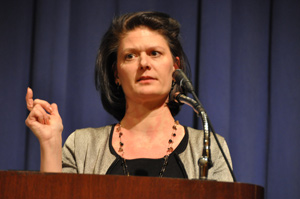
Emily Loose encourages academic authors to write book proposals and find an agent before approaching commercial or trade presses.
Photo by Janet Sassi
A panel of university publishing experts said that most academic dissertations are a long way from being considered publishable by book publishing industry standards.
Speaking on March 24 at “The Changing Landscape of Scholarly Publishing: Best Practices for Getting Your Book Published,” four panelists made explicit recommendations geared to help young faculty members and doctoral candidates navigate the shifting world of academic publishing.
William Germano, Ph.D., dean of the faculty of humanities and social science at Cooper Union, said that some dissertations are simply too narrow in scope for a readership audience.
“It is not useful to imagine that one’s dissertation can be slightly polished and published by Knopf one year later,” said Germano, author of Getting It Published: A Guide for Scholars and Anyone Else Serious about Serious Books and From Dissertation to Book (University of Chicago Press, 2001).
Germano suggested that scholars write on a piece of paper “who the book is for; who else has published books like yours, and where else they have been published” to help put their scholarly work into publishing perspective.
Emily Loose, senior editor at the Simon & Schuster imprint Free Press, encouraged authors to keep an open mind about approaching commercial or trade presses with academic materials.
“Every trade publisher, whether small or large, very much wants to be signing academics,” Loose said. “We are always looking for the next Sam Harris or Richard Dawkins.” Loose’s advice for academic authors was to write a book proposal and find an agent. In commercial publishing, she said, having an agent is the best way to get attention and receive the best representation.
It is the sales representative, however, that plays a key role in helping an author get a textbook contract, according to Alan Most, textbook editor at John Wiley & Sons.
“Every higher education publisher relies on its sales reps to find people who are writing texts and people who should be writing texts,” Most said. “Textbook publishers need dynamic people who want to improve education.”
Most said that a good way to break into textbook publishing, besides getting to know sales reps, is to do reviews of book proposals for the companies, or to contribute a chapter to a textbook.
“If a review comes in and it is beautifully written, it gets on our radar,” he said.
Even the most notable of academic presses is floundering in today’s sea change from print to online books, said Niko Pfund, vice president and publisher of the academic and trade division of Oxford University Press in New York:
“If there is one thing that you come away with in your understanding about publishers, it’s that we are all trying to figure out something we don’t understand: how quickly the print train is going downhill and how quickly the online train is ascending,” Pfund said.
“We are in an environment where, when we release our content to the world, it is like a dandelion seed—it just goes out there and you can scarcely keep track of it.”
Furthermore, with e-publishing, Pfund said, “you can publish your own book of poetry, your family memoirs and your collection of short stories.”
Pfund suggested that, between the “titanic forces” clashing over who is going to own information and the lack of predictability as to where the next online “locus site of aggregation” is going to be, nobody has enough information to predict the next two decades of academic publishing.
The panel was sponsored by Fordham University Press, and moderated by its director, Fredric Nachbaur. Nachbaur pointed the audience to FUP’s own manuscript submission guidelines as a basis for further understanding the requirements of academic presses.
